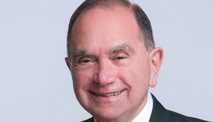Keys to a brighter future for Libya

- Edward Djerejian: Building a new regime in Libya requires imposing law and order
- He says the economy could be strengthened using funds from oil industry
- Djerejian says the U.S. should lend help but not put troops on the ground in Libya
- End of the Gadhafi regime would send a message to Syria's repressive leaders, he says
Editor's note: Edward Djerejian is the author of "Danger and Opportunity -- An American Ambassador's Journey Through the Middle East" (Simon & Schuster Threshold Editions, September, 2008.) A former U.S. ambassador to Syria and to Israel, he is the founding director of the Baker Institute for Public Policy at Rice University.
(CNN) -- The likely fall of Moammar Gadhafi's regime poses critical challenges to the emerging new Libyan leadership, to the United States and to the international community, and has important political implications for the future of the Syrian regime.
In the first instance, the Libyan National Transitional Council will have the primary responsibility for the restoration of law and order, a necessary condition for a viable political transition to a representative and inclusive political system and to economic development.
A political horizon that shows the Libyan people the way forward toward constitutional and judicial reforms, local, parliamentary and presidential elections, the establishment of civil society organizations, and a national security and defense structure under civilian leadership will be key to mobilizing national support. It would also provide the framework for launching the national economy, in which the energy sector plays a large role.
According to the International Monetary Fund, Libya's oil and natural gas industry in 2010 accounted for more than 95% of export earnings and 75% of government receipts. While the restoration of stability and the introduction of political reforms are crucial, Libya's economy will need to be invigorated to ensure longer-term prosperity.
With the largest oil reserves in Africa, Libya has abundant natural resources that, if properly developed and managed, could provide sufficient funds for supporting more broadly based economic growth and development across the country. This will not be easy. Shokri Ghanem, the former oil minister, has said restoring Libya's oil production to prewar levels could take more than a year, and the country's production of approximately 1.6 million barrels per day has been almost completely disrupted by the fighting.
 Why is Saif al-Islam Gadhafi free?
Why is Saif al-Islam Gadhafi free?
 Tough battles ongoing in Libya
Tough battles ongoing in Libya
 Gunfire, explosions across Tripoli
Gunfire, explosions across Tripoli
 Gadhafi son's arrest 'never confirmed'
Gadhafi son's arrest 'never confirmed'
Another important factor is the re-establishment of Libya's global economic and commercial ties and the receipt of the Gadhafi regime's substantial frozen assets abroad.
Secondly, the role of the international community in supporting Libya's political and economic transition is fundamental. The United States should continue and enhance its outreach and coordination within NATO and the UN, and with the Arab League and the African Union to promote humanitarian, political, economic and stabilization efforts.
Bearing in mind the lessons of post-conflict reconstruction in Iraq, the United States and European Union can advise the NTC on securing critical infrastructure and creating -- and administering -- more representative institutions, but it will be up to the NTC leadership and local commanders to ensure that fighters maintain discipline.
Those who have entered Tripoli and are poised to overthrow Gadhafi will need to be integrated into a national command structure. Old grievances and tribal differences may pose problems if the Libyan National Transitional Council does not fully integrate anti-regime elements from the west into a comprehensive political transition. It is far from clear that the jurisdiction of the NTC will be fully accepted in Tripoli and elsewhere in western Libya. Factionalism has emerged as a stumbling block for the rebels.
In any case, the United States' role should be a major supportive one, but it would be unwise for the United States to commit troops to stabilization efforts in Libya. We are already heavily committed in blood and treasure in Iraq and Afghanistan at a time of serious domestic economic and fiscal challenges.
The United States does not need the added burden of military involvement in yet another Muslim country, a development that would be exploited by extremists in the region. The Europeans have a more immediate geopolitical interest in Libya and can continue to take the lead with our strong support in the NATO context.
A note of caution is necessary. Popular uprisings and rebellions as in Libya are heroic manifestations of the human quest for freedom and liberty. However, the initial phase of a revolution needs to be transformed without undue delay into good governance, social justice and economic well being.
If not, revolutions can be hijacked by new brands of autocrats, either secular or religious. Hopefully, the Libyan people will be able to craft their political and economic future in a positive way.
In a regional context, Gadhafi's demise will not go unnoticed in Damascus. Like Gadhafi, President Bashar al Asad's regime is confronting its people and popular protests with lethal force.
When a people are brutally attacked by their government for protesting for their political, economic and social rights, the regime loses its legitimacy and it is only a question of time before end of regime scenarios emerge. It is no accident that Syrian protesters reportedly have chanted, "Gadhafi is gone, now it's your turn Bashar." The fall of the Libyan dictator only reinforces Syria's increasing isolation in the region.
The opinions expressed in this commentary are solely those of Edward Djerejian.








